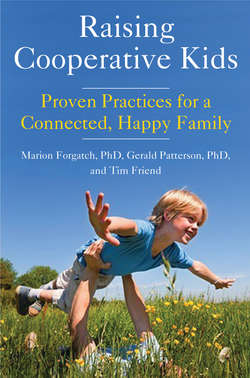Читать книгу Raising Cooperative Kids - Marion S. Forgatch - Страница 10
На сайте Литреса книга снята с продажи.
Practice, Practice, Practice
ОглавлениеIn the pages that follow, we address social skills, tantrums, discipline, chores, routines, communication with children and partners, connecting with teachers, ensuring children's safety, sticking together as parents when the kids pit you against each other, and having fun as a family. One of the most effective ways to transform our strategies from words on a page into new skills is to practice them with a spouse, partner, or friend before you try them with your children. Choose a specific family situation you are experiencing—anything from not doing chores to arguing with you and other adults. Then focus on one parenting tool at a time in the order we've presented them.
Play the role of parent while your partner plays the child. Play out the scenario as it takes place in the worst of times—for example, as you have seen it happen in other families. Consider exaggerating. Most families enjoy some good laughs from this exercise. Take turns playing different roles so both you and your partner have a chance to see the experience through the eyes of your children. Then try the role play again using the strategies presented in the chapters. This approach of doing it not so well and then using new tools works much like the rewind scenarios we give throughout the book.
Role play dramatizes the power of the techniques and makes it easier for you to see what a difference they can make. Feeling shy about role playing is normal. But parents tell us how enlightening it is when they use this approach. Role play allows you to practice the techniques before using them with your children. Parents say that the better they become at applying our strategies, the more they feel as if they have gained superpowers. If you take the time to role play, our techniques will come to life for you as you move through the chapters.
Each new skill presented here adds to a repertoire that you can use for increasingly complex situations and behaviors for your children. Because the skills are practical, they are easy to learn. Nothing that follows on these pages is based on opinion (we all have them) or on the parenting “fad du jour.” You will not hear about helicopter parents, indigo children, detachment parenting, or Training Up. What you will read is as close to a commonsense parenting manual as you will find.
By the time you finish this book, you will be using these skills automatically. When you need to refresh your understanding of a specific technique, refer to the list of strategies and resources at the back of the book. Whether you are just starting your family or are well underway, the present behavior of your children is the best predictor of their future behavior. So, if you want to make changes, now is the time to begin.
